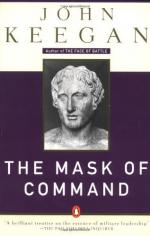
|
| Name: _________________________ | Period: ___________________ |
This test consists of 15 multiple choice questions and 5 short answer questions.
Multiple Choice Questions
1. Grant would be inaugurated as the __________________ president.
(a) Eighteenth.
(b) Seventeenth.
(c) Sixteenth.
(d) Nineteenth.
2. Keegan states that if there is any one historical document that details the Civil War in its entirety, that document would be what?
(a) The Personal Memoirs of U.S. Grant.
(b) The Letters of U.S. Grant.
(c) The Personal Memoirs of Abraham Lincoln.
(d) The Letters of Abraham Lincoln.
3. By mid-afternoon on April 6, nearly _______________ of Grant's army had deserted their posts and waited for a chance to escape the battlefield.
(a) One-third.
(b) One-fifth.
(c) One-fourth.
(d) One-half.
4. WWII would become what for Hitler?
(a) A nightmare.
(b) His re-creation of WWI, only with Germany arising victorious.
(c) An exciting adventure.
(d) Revenge for the death of his mother.
5. How many thought that Grant would rise up through the ranks as he did?
(a) Quite a few.
(b) Not many.
(c) Many.
(d) Several dozen.
6. The author quotes Grant as saying, "Find out where your enemy is. Get at him as soon as you can. Strike at him as hard as you can and as soon as you can and _________________" (p. 195).
(a) Go home.
(b) Take a break.
(c) Strike again.
(d) Keep moving on.
7. Keegan outlines Hitler's strategies and includes pertinent information from various sources, including notes from a conference in ___________________.
(a) Munich.
(b) Berlin.
(c) Hamburg.
(d) Rastenburg.
8. Additionally, the men who were enlisted were mainly stationed on and around the __________________ River to protect trade and settlement routes.
(a) Hudson.
(b) Rio Grande.
(c) Ohio.
(d) Mississippi.
9. The army was down to about ________ thousand men.
(a) Five.
(b) Three.
(c) Two.
(d) Four.
10. The United States only had _____________ thousand men compared to the two hundred thousand men in Britain's army.
(a) Eight.
(b) Ten.
(c) Five.
(d) Sixteen.
11. On what did Clausewitz focus?
(a) The end of the battle.
(b) The battlefield.
(c) Occupation of the capital.
(d) The reparations that must take place after a battle.
12. Hitler erected more than _____________ wartime lodgings.
(a) Fifteen.
(b) Twelve.
(c) Eighteen.
(d) Twenty.
13. Why was Grant chosen for his military appointment?
(a) For his involvement in the Mexican War.
(b) For his political connections.
(c) For his level of education received at West Point.
(d) For his level of education received at West Point and his involvement in the Mexican War.
14. Hitler was well known for adopting the axiom of whom?
(a) Clausewitz.
(b) Schmidt.
(c) Klein.
(d) Müller.
15. Included in Chapter Five are several photos and renderings of Grant, including a portrait and whose surrender at Vicksburg?
(a) Jackson's.
(b) Pemberton's.
(c) Davis'.
(d) Lee's.
Short Answer Questions
1. Did Hitler understood the axiom?
2. As a replacement for his presence, in what did Hitler engage?
3. The regiment in which Hitler served was filled with the type of people Hitler longed to be with but what?
4. What technological advancement was important during the American Revolution, the Peninsular War, and at Waterloo? This proves that military progress is inevitable.
5. Was the plan to destroy Poland before the English and French could intervene due to Hitler?
|
This section contains 503 words (approx. 2 pages at 300 words per page) |

|




